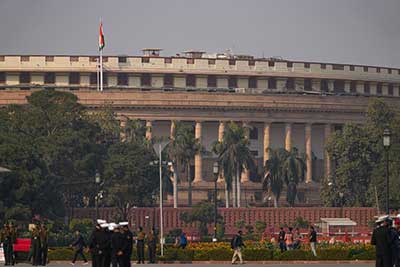Date: 28/02/2023
Relevance: GS-2: Indian Constitution—historical underpinnings, evolution, features, amendments, significant provisions and basic structure.
Key Phrases: Jan Vishwas Bill, Parliamentary Joint Committee, Budget Session, Decriminalize, Ease of Doing Business, Penalty, Appeal Mechanism.
Context:
- The Jan Vishwas Bill, which seeks to decriminalize minor offences and bring down the compliance burden for individuals and the industry, could be placed before Parliament in the second part of the Budget session.
- The Parliamentary Joint Committee, tasked to scrutinize the Bill after it was introduced in Parliament in December last year is likely to be ready with its report soon.
Key Highlights:
- On December 22, 2022, the Lok Sabha introduced the Jan Vishwas
(Amendment of Provisions) Bill, 2022.
- Its aim is to reduce the compliance burden on individuals and businesses and to promote ease of doing business.
- “The Parliamentary Joint Committee, which was formed to engage in
extensive discussions with stakeholders, has conducted six readings of the
Bill.
- It has been intended to present the Jan Vishwas Bill to Parliament during the ongoing Budget session when it reconvenes in mid-March.
- Under the Bill, as many as 183 sections across 42 Acts under 19
Ministries are proposed to be amended.
- These include the Indian Post Office Act, the Environment (Protection) Act, the Legal Metrology Act, the Motor Vehicles Act, the Public Liability Insurance Act and the Information Technology Act, 2000, among others.
Key Provisions:
- Decriminalizing Certain Offences: Under the Bill, several
offences with an imprisonment term in certain Acts have been decriminalized
by imposing only a monetary penalty.
- For example, under the Agricultural Produce (Grading and Marking) Act, 1937, counterfeiting grade designation marks is punishable with imprisonment of up to three years and a fine of up to five thousand rupees.
- The Bill replaces this with a penalty of eight lakh rupees.
- Revision of Fines and Penalties: In certain Acts, offences have
been decriminalized by imposing a penalty instead of a fine.
- For instance, under the Patents Act, 1970, a person selling a falsely represented article as patented in India is subject to a fine of up to one lakh rupees. The Bill replaces the fine with a penalty, which may be up to ten lakh rupees.
- Appointing Adjudicating Officers: As per the Bill, the central
government may appoint one or more adjudicating officers for the purpose of
determining penalties. The adjudicating officers may:
- Summon individuals for evidence.
- Conduct inquiries into violations of the respected Acts.
- These Acts include: the Agricultural Produce (Grading and Marking) Act, 1937, the Air (Prevention and Control of Pollution) Act, 1981, the Environment (Protection) Act, 1986, and the Public Liability Insurance Act, 1991.
- Appellate Mechanisms: The Bill also specifies the appellate
mechanisms for any person aggrieved by the order passed by an adjudicating
officer.
- For instance, in the Environment (Protection) Act, 1986, appeals may be filed with the National Green Tribunal within 60 days from the order.
Objectives to Be Achieved:
- The government's goal is to achieve "Minimum Government Maximum
Governance" through Ease of Living and Ease of Doing Business reforms.
- This involves simplifying, digitizing, and rationalizing compliances to reduce the compliance burden and improve the ease of living for people.
- The government aims to boost investor confidence and make India the most
preferred global investment destination by decriminalizing minor offences
and replacing them with monetary penalties.
- This will not only make lives and businesses easier but also reduce the judicial burden.
- The proposed Bill includes the rationalization of monetary penalties
based on the gravity of the offence and an increase in the minimum amount of
fine and penalty levied by ten percent after every three years.
- This will bolster trust-based governance
Conclusion:
- Decriminalization of minor offences will not only ensure that disproportionate punishment is not meted out for advertent and inadvertent wrongdoings that could be considered ‘minor’, but would also de-clog the courts.
- In addition to the Parliamentary Joint Committee conducting meetings with stakeholders, multiple Ministries and Departments have been directed to engage with various associations and provide their inputs.
- While the current version of the Jan Vishwas Bill is fairly comprehensive, any necessary minor changes or additions may be made based on the feedback received.
Source: The Hindu BL
Mains Question:
Q. Jan Vishwas Bill can help the government to boost investor’s confidence and make India the most preferred global investment destination. Comment (150 words).







